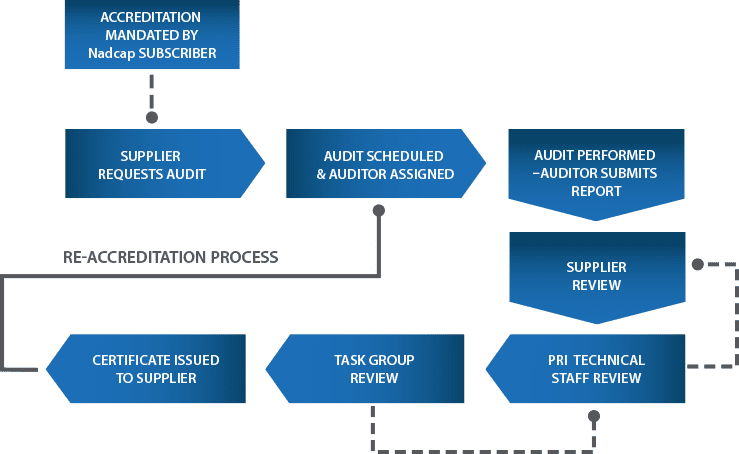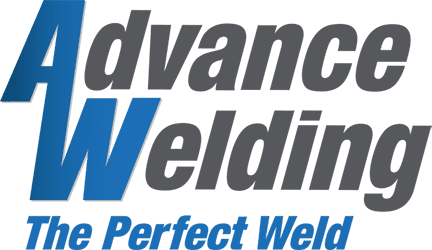Commercial Aircraft Quality and Nadcap
Commercial aircraft production occurs on a massive scale globally. In 2022, Boeing and Airbus delivered a total of 1,156 aircraft. Keeping aircraft production high while maintaining its unprecedented track record for safety requires the aircraft industry to maintain impeccable standards for reliability and quality manufacturing.
Aerospace companies manage to produce safe and efficient airplane systems, while continuing to advance the industry forward. This is done by the careful management of suppliers and every step of the supply chain. To make sure that all of the processes are held up to a consistent standard, a majority of the worlds aerospace manufacturers use the Nadcap program to perform audits and provide accreditation to each supplier. Learning about the Nadcap program will give you a closer look at how aerospace manufacturers work with suppliers to improve standards for efficiency and safety in our skies.
History of Nadcap
The consistent production of quality parts and assemblies across the entire aerospace industry was not always so efficient. Many years before Nadcap was founded, aerospace manufacturers determined that hiring an independent contractor was the most efficient way to build a plane.This process was much more difficult in a time before Nadcap because each aerospace manufacturer would have to individually audit suppliers to ensure the products were compliant to the specifications. Most suppliers worked with multiple aerospace companies and this system of individual audits meant they would have to be audited to the point of redundancy, wasting time and money for everyone. The process for creating Nadcap began in 1985 when both government and private aerospace manufacturers recognized a need to reduce redundant auditing. The United States Department of Defense began to use the process of specific auditing, and its effectiveness lead to its adoption by aerospace giants. To serve this purpose, SAE (Society of Automotive Engineers) incorporated the nonprofit PRI (Performance Review Institute). To this day, PRI serves as the administration of the Nadcap program, scheduling auditors, and connecting suppliers with subscribers. Nadcap Europe was established in 2000, and was followed by the launch of Nadcap Asia in 2003. Airbus, Boeing, Bombardier, and Cessna subscribed to the Nadcap program in 2002. Since then, the majority of the world’s aerospace manufacturers have accepted the Nadcap standards as their requirements.
What is Nadcap?
Nadcap (National Aerospace and Defense Contractors Accreditation Program) is a global program created for the collaboration of technical experts to set standards, audit, and accredit suppliers. Nadcap is unique in that the standards are set by a consensus of industry suppliers, contractors, and government representatives rather than imposed by an external regulatory body. Requirements for manufacturing processes are set and agreed upon at Nadcap conferences around the world. Aerospace suppliers are then accredited to these standards using the industry agreed checklist (audit criteria). This allows aircraft design engineers to efficiently outsource a wide range of processes and have confidence that the supply chain will deliver a quality end product. With a wide range of processes accredited, large manufacturers are able to outsource more of their production, leveraging a vast supply chain of vendors who are competing on a standard of quality but also on production efficiencies and response times. Suppliers have the ability to be audited in any of the Nadcap commodities, and once the Nadcap standards are reached, they are able to sell their products/services to the larger aerospace manufacturers and sub-tier customers. Nadcap has a long list of Prime subscribers. The aerospace industry is organized into “Tiers”. The top companies (end users) include Boeing, Airbus and Bombardier and Embraer to name a few. Companies that provide integrated systems to these top companies are often called Tier 1 suppliers. Tier 1 suppliers include GE, Rolls-Royce, Honeywell, United Technologies. Below these suppliers are Tier 2 and Tier 3 companies which supply complete parts and special processes.
Field of Nadcap Commodities
The Nadcap program provides accreditation for a wide arrange of commonly used processes in aerospace manufacturing. Companies can be accredited for the following: Aerospace Quality Systems (AQS) Aero Structure Assembly (ASA) Chemical Processing (CP) Coatings (CT) Composites (COMP) Conventional Machining as a Special Process (CMSP) Elastomer Seals (SEAL) Electronics (ETG) Fluids Distribution (FLU) Heat Treating (HT) Materials Testing Laboratories (MTL) Measurement & Inspection (M&I) Metallic Materials Manufacturing (MMM) Non Conventional Machining and Surface Enhancement (NMSE) Nondestructive Testing (NDT) Non Metallic Materials Manufacturing (NMMM) Non Metallic Materials Testing (NMMT) Sealants (SLT) Welding (WLD) Each field has a dedicated task group assigned to define the requirements, develop training content for suppliers, and award accreditation. These task groups are made up of experts in their specific fields, from both the supplier and manufacturer side. This ensures that criteria are both fair, and are meeting general safety requirements.
Nadcap Accreditation Process
With a majority of the aerospace industry requiring conformance to the Nadcap standards, many suppliers seek out Nadcap accreditation. To prepare for the audit, suppliers are provided with the requirements established by the Nadcap program. Once the supplier has these requirements, they must carefully review and examine their hardware and company processes for nonconformance issues. When the supplier is prepared and has paid for their audit, an auditor is assigned to them to review their processes. Auditors are industry approved, and after evaluating a supplier, they submit the report to be reviewed by PRI engineers.
Should any nonconformances be discovered, PRI staff engineers give the supplier the opportunity to correct these issues. Once all of the requirements are met, the certificate is granted to the supplier, and accreditation is attained. From here, suppliers continue to work with PRI to ensure that the new program has been integrated effectively. Suppliers must go through a re-accreditation process to verify that the quality of work has been maintained.

Nadcap Meetings
With a majority of the aerospace industry requiring conformance to the Nadcap standards, many suppliers seek out Nadcap accreditation. To prepare for the audit, suppliers are provided with the requirements established by the Nadcap program. Once the supplier has these requirements, they must carefully review and examine their hardware and company processes for nonconformance issues. When the supplier is prepared and has paid for their audit, an auditor is assigned to them to review their processes. Auditors are industry approved, and after evaluating a supplier, they submit the report to be reviewed by PRI engineers.
Should any nonconformances be discovered, PRI staff engineers give the supplier the opportunity to correct these issues. Once all of the requirements are met, the certificate is granted to the supplier, and accreditation is attained. From here, suppliers continue to work with PRI to ensure that the new program has been integrated effectively. Suppliers must go through a re-accreditation process to verify that the quality of work has been maintained.
Commodity Task groups are an integral part of setting Nadcap’s standards. There is one group per accreditable process. Each group is required to work together to determine the audit standards, develop content to assist in audit preparation, and make the final decisions on accrediting suppliers. To ensure that requirements are set to a high standard from a technical perspective, representatives in each group are knowledgeable members of the industry. Advance Welding’s management team is part of the Welding Task Group as Supplier Voting Members (SVM).
The Supplier Support Committee represents the suppliers in the Nadcap program to ensure that it is effective for the manufacturers as well as the suppliers. The committee assists contractors through the process of accreditation, and continues to support them in the program throughout the duration of their membership.
Benefits of Nadcap to the Aerospace Industry
Nadcap is used by the majority of the aerospace industry, and for good reason. Before Nadcap, each supplier was audited by aerospace manufacturers separately, which lead to redundancy and wasted man hours. PRI and the Nadcap program were created to eliminate redundant audits. Standards for the Nadcap program are set through the collaboration of suppliers and manufacturers alike. Each category of accreditation has a task group that consists of process experts, who vote on the standards for each process. The collaboration allows many different perspectives on the criteria to make sure that the ideas brought to the table are well considered. From there, a supplier must request a single audit for a specific process. The supplier is carefully evaluated to make sure that they are meeting all of the standards set by the Nadcap teams. Once suppliers are certified, they are able to sell to any of the Nadcap subscribing manufacturers. This opens up an entirely new market. The individual manufacturers benefit in that they no longer have to keep up with auditing each individual supplier. Nadcap saves time and money for both sides, and creates a precedent for the criteria to innovate with new ideas in the industry.
Nadcap Welding & Brazing
To achieve accreditation, each supplier must follow a specific set of steps for the audit preparation. In preparation for the welding audit, suppliers must ensure their processes for quality, inspection, personnel qualification, procedure control, material control, equipment, process control, maintenance, filler materials, gases and calibration comply with the Nadcap audit criteria checklist. Auditors review the audit criteria checklist against the supplier’s procedures for compliance. Multiple job audits are also performed on the shop floor. Every standard of inspection is set to make sure the highest quality product is created for use in the manufacturing process. To learn more about Nadcap Welding & Brazing go here. To learn about specifically Aerospace Brazing, go here.
Nadcap Heat Treating
Heat treating involves the heating and cooling of metals to change the physical characteristics of the metals. This can increase the strength of the metal, remove stresses when shaped, and tempering to increase ductility. To learn more about Nadcap Heat Treating, visit our blog here.
Nadcap NDT (Non-Destructive Testing)
Non-Destructive testing is integral to the aerospace industry. It is used to test the composition and integrity of materials. It is important because it allows for testing of parts while they are already produced, or possibly on the aircraft, without needing to destroy the part. This way each part can be tested to ensure quality before it is applied to aircraft. Nadcap accreditation criteria ensures that equipment is correctly calibrated to measure the physical properties of the materials being tested. We outsource our NDT to approved labs that conform to regulatory codes, industry standards and customer specifications. Non-Destructive Testing is important to ensure the safety of the materials being used in aerospace production. The Non-Destructive Testing accreditations that Nadcap provides include:
- Liquid Penetrant Testing
- Magnetic Particle Testing
- Ultrasonic Testing
- Radiographic Testing
- Eddy Current Testing
- Subscriber Action Committee- monitors audit requirements to guarantee the process remains fair to the subscribers.
